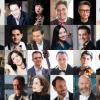
Chamber music is played mostly in small venues (since the days of royal chambers), which — limits income — just one reason why starting and maintaining a chamber music festival is a demanding task, seldom succeeding.
A heartening alternative is Music@Menlo, founded and led by Artistic Directors Wu Han and David Finckel. This festival has not only triumphed over two decades — overcoming COVID, inflation, and travel problems for an event involving international participants — but served as an example to others. Finckel told SF Classical Voice:

“As Music@Menlo heads toward its 21st season, we look back at its accomplishments and forward to its possibilities. The depth of programming has set an example now known and in many cases emulated internationally; the so-called ‘Menlo Effect’ has resulted in over 30 start-up series and artistic directorships in the hands of our Chamber Music Institute’s alumni.
“With a wealth of chamber music still to be performed, and a steady stream of increasingly gifted senior artists and students, the festival’s supply chain is flowing freely, and we find ourselves constantly inspired by how much room Music@Menlo still has to grow, to delight listeners new and old, and to influence the world of classical music for the better.”
With a title of “Beethoven Unfolding,” season 21 will center on performances of all 16 of the composer’s string quartets, intertwined with one of Music@Menlo’s signature “Unfolding of Music” programs, moving chronologically through the history of chamber music.
“We will experience the development of chamber music” say the artistic directors, “in parallel with the evolution of Beethoven’s quartets, performed in order of composition by a stellar ensemble familiar to Music@Menlo audiences: the Calidore String Quartet.”
The season begins with an all-Baroque program and heads into the Classical era; next is Beethoven seizing the helm of quartet composition from Mozart and Haydn.
Beethoven’s transition to his “heroic” period, with quartets of unprecedented difficulty, is then reflected in large-scale works of early Romantic composers.
Leaping into Beethoven’s final decade, works from the late Romantic era precede chamber music of the 20th century and beyond. To conclude, Beethoven’s final quartets parallel a program of works by living composers.
Concert tickets are $15–$85 for individual events, $100 for an all-access livestream pass (six concert programs). VIP presale and subscriptions are now available; single tickets go on sale March 13.
The distinguished Beethoven biographer Jan Swafford makes his festival debut leading off the “Encounter” series, and violinist/lecturer Aaron Boyd returns to lead the second “Encounter,” tracing the evolution of the string quartet since Haydn. A new feature, “Inside the Quartets,” precedes each Beethoven program.

“Overture Concerts” return, showcasing the multigenerational collaboration of Chamber Music Institute and mainstage artists. The “Mornings@Menlo” series offers open-access master classes, “Café Conversations,” and performances by Chamber Music Institute participants.
Music@Menlo’s Chamber Music Institute is one of the most well-regarded summer programs in the U.S. for string players and pianists. Since its beginning, the institute has brought together more than 700 talented young musicians and a world-class roster of artists for an intensive three-week training program.
The institute consists of the International Program for preprofessional artists (ages 20 to 30) and the Young Performers Program for pre- and early-conservatory-level students (ages 10 to 19).
To show the variety and depth of programming, here are just the first and last main concerts this season (in addition to the Beethoven quartets and other events):
Concert Program 1, “Baroque Splendor,” July 15 (6 p.m.), Spieker Center

Telemann: Concerto in D Major for Four Violins, TWV 40:202
Torelli: Sonata in D Major for Trumpet, Strings, and Continuo, G. 1
Vivaldi: Concerto in A Minor for Bassoon, Strings, and Continuo, RV 497
Handel: “Eternal Source of Light Divine” from Ode for the Birthday of Queen Anne, HWV 74
J.S. Bach: Aria from cantata Jauchzet Gott in allen Landen, BWV 51
Handel: “Let the Bright Seraphim” from Samson, HWV 57
Handel: “Per te lasciai la luce” and “Un pensiero voli in ciel” from Il delirio amoroso, HWV 99
Vivaldi: Concerto in D Major for Flute, Strings, and Continuo, RV 428 (“Il gardellino”)
Geminiani: Concerto Grosso No. 12 in D Minor, H. 143 (“La follia”)
Erika Baikoff (soprano); Sooyun Kim (flute); Peter Kolkay (bassoon); David Washburn (trumpet); Gilbert Kalish, Hyeyeon Park, Mika Sasaki, and Wu Han (harpsichords); Aaron Boyd, Chad Hoopes, Ani Kavafian, Kristin Lee, Arnaud Sussmann, James Thompson, and Tien-Hsin Cindy Wu (violins); Paul Neubauer and Tien-Hsin Cindy Wu (violas); Dmitri Atapine, David Finckel, and Mihai Marica (cellos); and Scott Pingel (bass).
Concert Program 6, “Chamber Music Now,” Aug. 5 (6 p.m.), Spieker Center
Jessie Montgomery: Duo for Violin and Cello (2015)
Wang Jie: New work (2023) (Music@Menlo co-commission)
Brett Dean: Seven Signals for Clarinet, Violin, Cello, and Piano (2019)
David Serkin Ludwig: New work (2023) (Music@Menlo co-commission, world premiere)
Tan Dun: Concerto for Pipa and String Quartet (1999)
Fred Child (narrator); Sooyun Kim (flute); Tommaso Lonquich (clarinet); Min Xiao-Fen (pipa); Hyeyeon Park and Wu Qian (pianos); Bella Hristova, Kristin Lee, Arnaud Sussmann, and Tien-Hsin Cindy Wu (violins); Paul Neubauer (viola); and Dmitri Atapine, Nicholas Canellakis, and Sihao He (cello)




